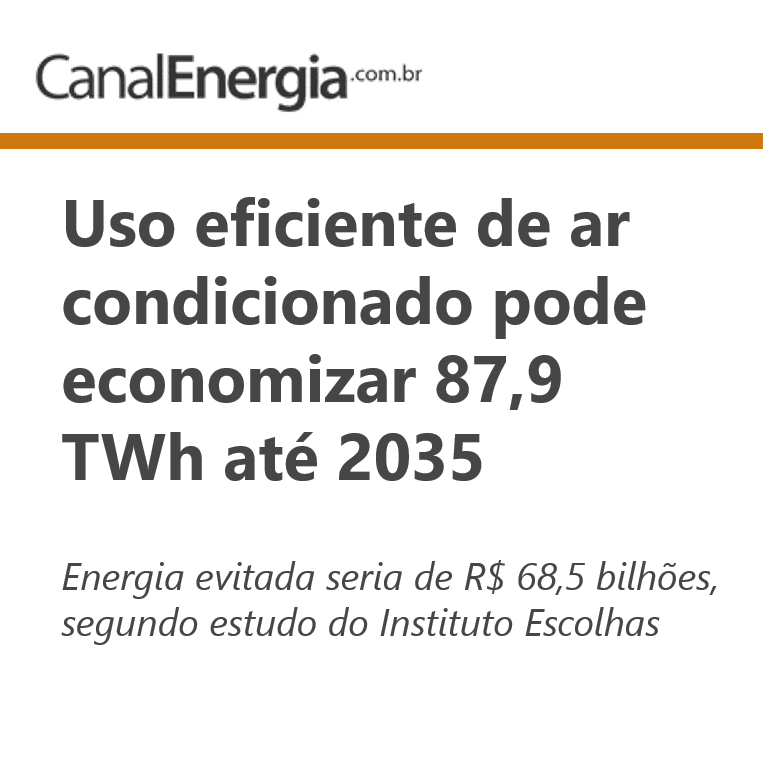Canal Energia brings the “Ways of air conditioning energy efficiency in Brazil” revealed in a study by Escolhas

The text informs that, according to the study made by Escolhas, a change in the Brazilian industrial policy may be the key to energy efficiency in the sector and to savings in the pockets of consumers and manufacturers of air conditioners in Brazil. Read in full.
Efficient use of air conditioners can save 87.9 TWh by 2035
Energy avoided would be R$ 68.5 billion, according to a study by “Instituto Escolhas”
SUELI MONTENEGRO, FROM AGÊNCIA CANAL ENERGIA, BRASÍLIA
A study prepared by “Instituto Escolhas” indicates that it is possible to achieve 87.9 TWh in energy saved with air conditioner, or R$ 68.5 billion in an amount of avoided energy by 2035, considering a 3% annual growth in appliance sales in Brazil. This amount corresponds to 64% of all Brazilian residential consumption in 2019, or to the consumption of 56 million homes in 2020, and means 6.7 million tons of CO2 equivalents avoided during one year.
The paper considered three scenarios of annual growth in equipment sales. In Scenario A, the increase would be 1%, the efficiency gain 2% and the energy savings would be 74.6 TWh. In Scenario B, the increase would be 2%, the efficiency gain 1.75% and the energy savings would be 81 TWh. In Scenario C, with 3%, the efficiency gain would be 1.25% per year for the next 15 years.
In early July, an Inmetro ordinance perfected the Brazilian Labeling Program (PBE) for air conditioners, tightening the criteria for classifying an equipment as “A” (lower consumption). Without an integration of the industrial policy with goals for energy efficiency gain, the new labeling can, however, create difficulties for equipment manufacturers, alerts the institute’s Project Manager, Gabriel Kohlmann.
For the specialist, some manufacturers that operate in Brazil may even be able to meet the targets, through the import of appliances or because they produce the compressors themselves, but others will face problems. The most important thing about this change in the efficiency scale is that all the devices that are currently on label A will fall from 2022 to label C and then to label D.
This means that the industry will have act to have a more efficient supply of appliances. But manufacturers are not prepared to make this transition, by virtue of the Free Economic Zone of Manaus’ incentive policy, which concentrates all industrial units in the sector. “Today you have a model of production and commercialization of air conditioners that is somehow tied to a system that hinders technological updating”, Kohlmann points out.
This results in inefficient appliances with higher consumption, which lead to an overload of the electrical system at peak times. The use of air conditioning corresponds to 14% of residential electricity consumption in Brazil and represents 80% of the average monthly consumption of households without such appliances, which in 2018 was 162.48 kWh. It is expected that by 2035 there will be additional demand due to the use of such equipment of 240.94 TWh.
Approximately 98% of the air conditioners sold in Brazil are produced in the industrial pole of the capital of Amazonas. The point is that to produce in the free zone it is necessary to follow the Basic Productive Process (PPB), which requires the filling of a quota of consumables, in this case the compressor, which is produced by a single supplier.
The industry claims that to change the labeling, which is the Inmetro’s assignment, it is necessary to change the PPB. This change, however, involves the Superintendence of the Free Economic Zone of Manaus and the Ministries of Economy and Science and Technology. “This is a fine adjustment that needs to be done between the government and the industry in the design of such PPB, because to the extent that you make this flexibility, the import of consumables or the import of air conditioning equipment itself is fostered. On the other hand, having more competitive devices means more saving in the consumer’s pocket.”
The proposal is to establish a model of Basic Productive Process by points, which has existed in the past, for the purposes of granting tax incentives. If the manufacturer uses a specific component from a national supplier, it earns a certain number of points. There would also be a lower requirement for local content for components that would contribute to greater energy efficiency of the devices. To access the incentives, the company would need at least 60 of the 100 possible points.
According to Kolmann, all this part is conducted by a partner organization, “Instituto Clima e Sociedade”, which had already been working with the government to conduct a public consultation by the Ministries of Economy and MCTI. The information in the government was that the consultation was about to be launched, but that was before the coronavirus pandemic.
The study by “Instituto Escolhas” is to be officially presented at a workshop scheduled for mid-August with government, industry, consumers and the electric power sector representatives. In addition to the results, the institution intends to reflect on what air conditioning consumption will be like in the post-crisis, in view of the possible perception of health risk by the consumer that may discourage the purchase of new equipment.
Related
Brazil attended COP-6 in Minamata without presenting an action plan to address mercury usage in mining
Study shows 2,274% increase in herbicide use for soybean production
Technical assistance is prevalent in legal regulations and public policies; however, a study indicates that it does not adequately reach rural producers
Study reveals Brazil applies pesticides and fertilizers inefficiently and unsustainably in soybean farming

 Texto
Texto